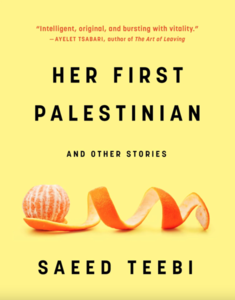"What it Means to Be a Palestinian in Diaspora" Saeed Teebi on His Vivid & Wise Short Fiction Debut
Writer and lawyer Saeed Teebi's short story, "Her First Palestinian", an evocative, uncomfortable, brilliant gem of a character study, was shortlisted for the prestigious CBC Short Story Prize in 2021. Just a year later, his debut full length collection, Her First Palestinian (House of Anansi Press), taking its name from its powerhouse title piece, is out for readers to savour more from Teebi.
Themed around the lives of several very different Palestinian immigrants in Canada, the stories are tight, sharp, and wise, each one at once a compelling world of its own and powerfully connected to the others. In these pages, Teebi establishes himself as an exciting new voice in short fiction, writing the complications of immigration, diasporic life, persecution, and political tensions with elegance and insight.
We're excited to speak with Saeed today about the collection and his writing process, as part of our Keep It Short interview series for short story writers. He tells us about how his characters are all different from one another but linked by their experience of the "oppressive restrictions on what Palestinians can say or do", explains why short fiction demands a certain level of "withholding" from a writer, and shares an innovative, genre-blurring story collection he recently discovered and would recommend to short fiction lovers.
Open Book:
How did you decide what stories to include in the collection? When were they written?
Saeed Teebi:
The nine stories in this collection were written in approximately a one-year period during the height of the pandemic in 2020 and 2021. I included every story that I wrote in that time, as I was focused on writing a more or less cohesive collection that engages with Palestinian immigrants and refugees living in Canada.
OB:
What do the stories have in common? Do you see a link between them, either structurally or thematically?
ST:
The stories are not formally linked. Each story takes place in its own ‘world’ so to speak (although that world is often Toronto), and has its own structure and style. The stories are very much intended to “go together” because they involve characters in diaspora. But I tried to be as diverse as possible thematically because personal experiences are always differing and multi-faceted. (Not to mention, I needed to keep myself interested!)
Of course, certain concepts cannot help but recur. My characters are often alone or alienated, they are often faced with seemingly insurmountable problems or forces, they often feel misunderstood or out of place, and they often feel on the very edge of what they can bear but try to push through anyway. The insistence of these characters on not just apathetically putting up with their lot in life is something that unites many of my stories. It’s interesting to me, because I only realized this looking at the stories in retrospect – it certainly was not a conscious decision made as I was writing.
Another aspect linking the stories is an undercurrent of geopolitics that impinges on how the characters are and how they behave. In particular, this collection has several stories that take a very close look on what it means to be a Palestinian in diaspora in this historical moment – the kinds of oppressive restrictions on what Palestinians can say or do, and in what ways, and in what contexts.
OB:
How did you decide which story would be the title story of your collection? Why that story in particular?
Your CanLit News
Subscribe to Open Book’s newsletter to get local book events, literary content, writing tips, and more in your inbox
ST:
“Her First Palestinian,” the title story and the first piece in the collection, is the only story that had been previously published, as it was shortlisted for the 2021 CBC Short Story Award. It explores themes of Palestinian identity, and how that is perceived by outsiders and by Palestinians themselves. For that reason, and for the simple fact that it proudly includes the word ‘Palestinian’ in the title, I was happy to use it as the title of my debut book.
OB:
What do you enjoy most about writing short fiction? What is the toughest part?
ST:
I enjoy being able to deliver an acute dose of entertainment and resonance in a relatively short span. The idea is very attractive to me that a reader can spend potentially less than half an hour with a character and yet feel somehow very strongly about them – to the point where the character’s ultimate fate feels important to the reader, and stays with her. In some ways short stories are a literary gateway that is particularly appropriate for our age – there is not a lot of investment of time or attention that is required to potentially get a significant reward in art and understanding.
Frankly, the reverse side of that is that I also simply enjoy being able to finish a short story quickly.
Writing short stories has its difficulties though. Short fiction, particularly in the Western tradition, requires a high level of discipline from a writer. It requires distilling your piece to only the absolute most relevant parts, and mercilessly removing all the other aspects that may be interesting or colourful or insightful but are ultimately not elemental to a short piece. I sometimes think that a novelist has to be more of a giver, whereas a short story writer has to be more of a withholder.
OB:
Did you do any specific research for any of your stories? Tell us a bit about that process.
ST:
One of my stories, “Ushanka,” is partly set in the time before the Palestinian Nakba in 1948, the year when Israel was founded via the forcible removal and ethnic cleansing of Palestinians from much of historical Palestine. To write that story, I had to refer to history books documenting that era, and in particular books written by Arab writers as contemporaneously as possible with those cataclysmic events. For me, it was also important that I see as much visual material as possible, so I also relied on picture books like Before Their Diaspora by Walid Khalidi. Even if none of what I saw ended up directly in the story, it was helpful to better understand the general mood and context.
And of course, there is no research that can replace the oral histories that come from elders in the community, including most importantly for me, my mother.
For other pieces in the collection I had to do research involving more contemporary sources. For example, the kinds of silencing campaigns that some Palestinians face around the world today – these are things that I knew of and experienced myself. But it was important to always double check with external sources to make sure my knowledge was accurate.
OB:
Do you have a favourite short story collection that you've read? Tell us why it is special to you.
ST:
Jhumpa Lahiri’s Interpreter of Maladies and David Bezmozgis’s Natasha and Other Stories are favourite collections, and I reread both while composing Her First Palestinian.
But the one I would like to highlight is The Corpse Exhibition, by Iraqi writer Hassan Blasim, whom I discovered only recently. It’s a collection about living in and through the Iraq War. Innovative structurally, the collection mixes grim (and sometimes gory) war-addled realism with almost crazed fantasy. It evoked for me feelings that I am still trying to understand. Basically, it made me experience new emotions, which I think is rare and important in writing.
OB:
What if, anything, did you learn from writing these stories?
ST:
As with anyone doing the highly solitary work of writing, the question sometimes occurred to me: will anyone care about this? It was very gratifying to learn that, yes, in fact quite a few people did care about my writing, and supported it from the time they had a chance to read it. In some ways, that part will likely never cease to amaze and humble me.
______________________________________________________
Saeed Teebi is a writer and lawyer based in Toronto. His story “Her First Palestinian” was shortlisted for the 2021 CBC Short Story Prize. He was born to Palestinian parents in Kuwait and, after spending time in Connecticut and California, has lived in Canada since 1993.






